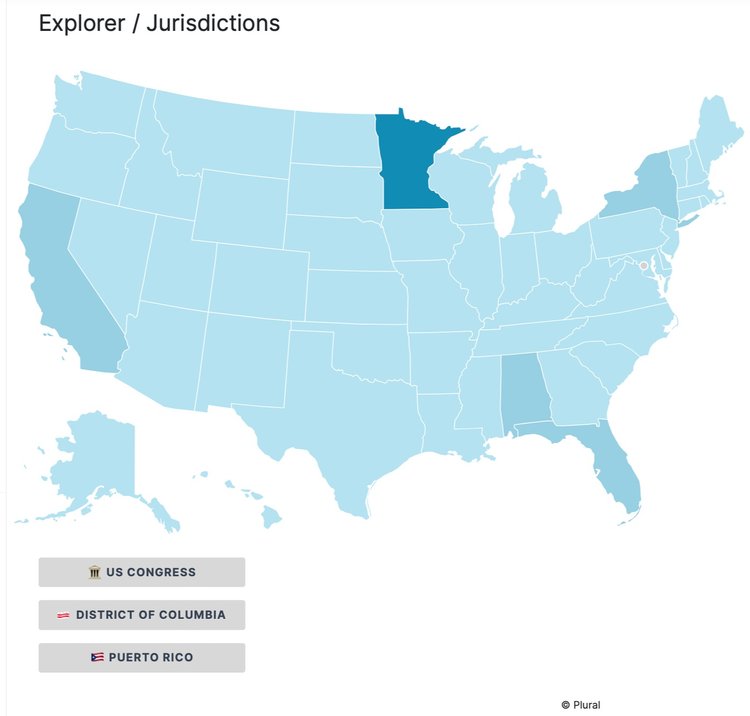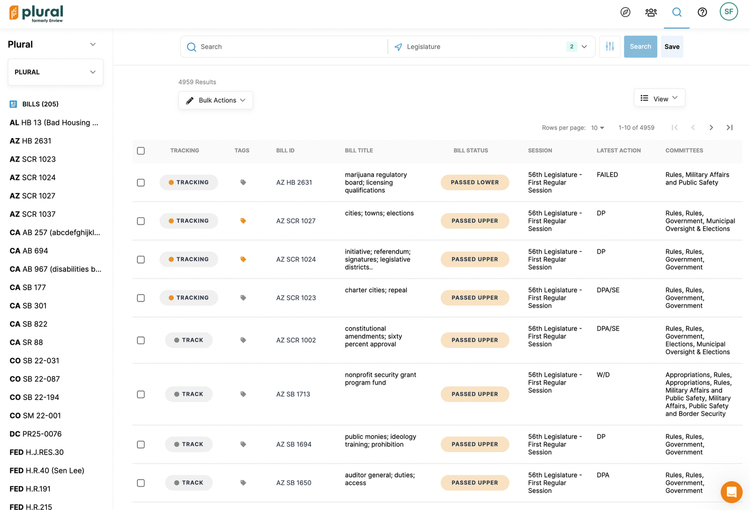Lobbying at the state level is the practice of engaging with lawmakers and policymakers to advocate for a particular cause or interest and being compensated for the act of political influence. It is an organized way for individuals or groups to express their opinions, share information, and attempt to influence the decisions made by the state government. The words “advocate” and “lobbyist” are often used interchangeably, as both often work to influence politics and policy at the state and federal level. However, each fulfill a different role and are considered legally different by every state government’s regulations. The most significant difference between advocates and lobbyists is that advocates are not paid to participate, while lobbyists are. Lobbyists can work for almost any group, including corporate firms, private companies, non-profit organizations, trade organizations, political interest groups, and even individuals seeking to impact policy. Some of a lobbyist’s general functions include establishing relationships with key decision-makers, holding meetings with government officials, attending public hearings and committee meetings, and, most importantly, monitoring and tracking policy to stay informed, relevant, and strategic.
Lobbying at the State vs. Federal Level
Lobbying at the state level versus at the federal level is very similar, but there are some key differences between the two practices, including: jurisdiction, the scope of authority of each legislature, and the differences in the legislative process between state governments and the federal government.
Jurisdiction
First, the jurisdiction of the federal government encompasses all states in the United States. As such, policy objectives when lobbying the federal government are often broader. Further, federal policies impact the entire American population, generating a higher level of impact on a broad range of different groups, organizations, and communities. Laws passed by state legislatures, on the other hand, only affect the citizens of a given state.

Scope
Another key difference between state and federal policy is the type of differing types of issues that each can address. For example, state governments handle matters of education, healthcare, transportation, and other localized issues. In comparison, the federal government is tasked with handling issues that impact and regulate the entire county, such as immigration policy, the military, international relations and conflict, and commerce.
Therefore, should a lobbyist be charged with the responsibility of impacting immigration policy, their efforts are more likely to be targeted at the federal level, since the federal government has a higher scope of authority on the issue.
Legislative Processes
Lastly, the difference in legislative processes between individual state governments and the federal government are immense and often require specialized knowledge. State and Federal governments have different rules for who may introduce bills, how committees are run, and even how voting will occur in their respective legislative chambers. These differences create the need for lobbyists who understand these differences and are able to continue to leverage influence, strategize and support in order to continue to defend their respective causes within a specific legislative context.
Six Steps to Effective Lobbying
Lobbyists, in essence, are messengers who work to convey their concerns, ideas, and policy suggestions to elected officials, legislative staff, and other political decision-makers. While the specific process and legal requirements behind lobbying and policy influence do depend on each specific state and its regulations, here are six steps to help you successfully lobby at the state level:
Determine Your Legislative Priority
First, determine your legislative priority by narrowing down the “what”, “when”, and “how” parameters of your organization’s mission and goals. For example, if your goal is to increase equity within education systems in the state of California, Michigan, or Texas, ask yourself: what specific problem must be addressed in my state in order to reach my goal of educational equity? Answering this question will allow you to narrow down exactly what needs to be addressed. It is essential to consider a broad variety of ideas and conduct thorough research and analysis to understand the dynamics of your problem, and how it will be most successfully addressed.
Next, identify the “when”. When understanding a problem you are likely to come up with a laundry list of issues that must be solved, and creative solutions that are essential to implement. Answering ‘when’, reminds one to think intentionally within the context of the current legislative session, what will be most impactful, and identify the current state of political interest in your topic. For example, when seeking educational equity in California, defining ‘when’ will include analyzing what factors are necessary for your change to occur, you will want to set your strategies on when your issues will become the most salient. Such as during an election year. During election years there is momentum and will from legislators to make policy improvements that positively impact their constituents, often education is one of these all encompassing issues.
Finally, identify the “how” by creating a list of strategies and goals that will enable you to create a successful legislative plan. Defining how you will strategize comes from understanding the audiences that are both against and for your suggested policy adjustment. Continuing the example of education equity in California, it will likely be most advantageous to have a strong relationship with PTA (Parent Teacher Associations) boards, student leaders who you coordinate with to amplify the necessity of your issue and the state should be in an economic state that has space to request additional programs in the states education budget. The combination of identifying what, when, and how allows you to create a clear legislative strategy that is consistent with your mission and relevant within the current political context.
Identify Your Target Lawmaker(s)
Now that you have your legislative priorities clear, it is essential to identify your target elected officials, legislative staff members, and coalition leaders. The individuals who are essential to identify will be those with whom your goals align, or those who may be a roadblock to you achieving your goals.
In order to identify those who will work to assist you in completing your goals, conduct research on the representatives who govern the area most impacted by your policy issues and become familiar with their legislative goals for the session to determine if there is alignment. You can also identify news, politics, and academic leaders within the research that support your cause, as they will be helpful in generating knowledge and awareness of your campaign issue.
In order to identify those who may work against you, look at the voting records of the state you are planning to lobby within, seek out their voting history on the issue you are lobbying for and identify those who have a consistent track record of voting against projects like yours.
Use Plural to identify key political officials on the committees that will be reviewing your policy proposals. Within Plural you can search for any legislator and be immediately provided with the comprehensive list of their office contact information, committee assignments, vote data and all of their authored and co-sponsored bills. Further, you and your team can make notes in the legislator’s profile. Having one location for this level of essential data is critical for lobbying. Lobbying opportunities can present themselves at unexpected moments, sometimes in elevators, hallways, or post committee meetings to have the ability to look up a legislator’s name and understand their political perspective and key roles in the legislature provides a key advantage to those who utilize Plural to lobby and track policy.
Refine Your Messaging
Next, it is essential to define your messaging as an individual and organization when lobbying. Establishing your messaging involves understanding your audience, the issue at hand, and your proposed solution. Your messaging is essential to a successful lobbying campaign — how people understand and connect with your campaign can generate political will.
A unique way to refine your messaging is to connect your issue and policy solution to a compelling narrative. This can happen by connecting policymakers with the community of individuals who are directly affected by the policy you are seeking to change, humanizing the overall issue.
When engaging with individual staff members and elected officials, be sure to emphasize the local impact of your policy proposal and how it aligns with constituent needs and interests. Provide specific examples or stories that illustrate the positive effects on their district or region and be sure to personalize the issue to make it more relatable and relevant.
Consider Your Approach
When considering how to approach your lobbying efforts at the State Capitol, there are many ways to engage with the political process. Be sure to research the legislative process, the state budget, influential government officials and staff members, and, most importantly, your state’s guidelines surrounding engagement with politics and policy.
There are many different approaches to engagement with staff members and elected officials, including 1:1 meetings, organized events, volunteer efforts, fundraising dinners, state capitol protests, or simply running into them in the halls of the Capitol building. Each approach provides benefits or disadvantages, in order to make each a success focus first on building relationships as they are core to the political process.
Reach Out
Reaching out to elected officials and government employees can be an intimidating experience, especially when you are not sure where to start.
A great place to start is by researching and connecting with people on committees where many of your bills will pass through. For example, a lobbyist who works for an education non-profit will want to research the education committee members and reach out to individuals who align with their ideals. Using Plural, a lobbyist could begin with our Jurisdictions Map, locate their state, and then view all the committees in the state legislature. Plural provides the partisan party makeup of each committee and the structure of each committee. This information is valuable to a state-level lobbyist in strategizing connections and building issue awareness in order to pass essential legislation.

Remember to Follow Up
Always remember to follow up. Staying connected and relevant in today’s world can be difficult; make it a fundamental task to stay in touch with your representatives and political coalitions as a lobbyist or advocate.
When lobbying, there will be many policies that connect to your mission and require your consistent attention. Using Plural, you can track individual bills that you are focusing on for the legislative session in your state. While tracking a bill, Plural will notify you of upcoming events and actions on the bill prior to essential vote days, or days when your bill will be read in committee you should follow up with your representatives about their necessary support. This follow-up can be a reminder of the research gathered by your organization proving that the policy would be positively impactful for the community you represent.

Plural for Lobbyists
Impacting state policy is no easy task – as such, state-level lobbying is most often a coordinated, team effort because of the level of work that it takes to make an impact on state policy. Using Plural, a small team of lobbyists can do the work of a large organization by intelligently tracking policy, keeping people connected to important events, and creating workspaces optimized for collaboration.
As a state-level lobbyist, one of your most important duties is to track multiple bills as they move through committees and chambers within your respective state capitol. Plural streamlines bill tracking so that your team can all be aware of the priority bills that will be watched most closely throughout the session. Further, as a lobbyist, it is essential to build relationships with the correct government officials, utilizing Plural you can easily find contact info for committee leadership and majority or minority leaders of the House and Senate. . Quick access to information on government officials increases democratic access by making it easier to connect with one’s representatives.
Lastly, Plural is a collaborative tool for members of your organization and team to connect with the legislative process and bill text directly. Team members can annotate bill text, highlight areas, make notes and share these actions with all members of your team to keep people informed, up to date and hold a critical eye to the text of complicated legislation.
